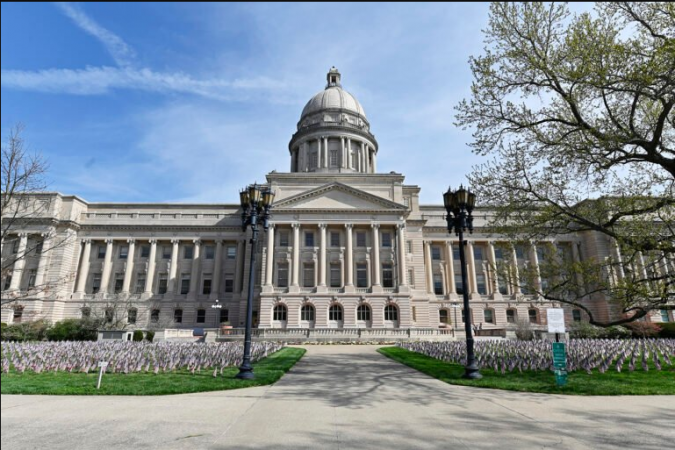
United States: Three Jewish women in Kentucky have filed a lawsuit alleging that a set of state laws outlawing most abortions violates their religious freedom.
The lawsuit was filed in the Jefferson Circuit Court in Louisville and is the third lawsuit of its kind to be brought by Jewish groups or individuals since the U.S. Supreme Court ruling in Dobbs v. Jackson Women's Health Organization in Roe v. Wade was reversed.
Also Read: Hindus in Bangladesh fearfully observe the Durga Puja festival
Jewish plaintiffs in all three lawsuits—one in Florida, the other in Indiana—claim that their state is infringing on their right to freedom of religion by imposing a Christian concept of beginning of life.
According to the current legal framework of Kentucky, life begins with fertilization. After six weeks, when the first signs of cardiac activity appear, the second law outlaws abortion.
When voters in Kentucky decide whether to adopt a proposed constitutional amendment that would outlaw abortion in the state, abortion will be on the ballot next month.
According to Ben Potash, one of the lawyers who filed the complaint, "there's a whole patchwork of laws that have been passed over the past 20 years." They are intrinsically contradictory and, put together, are very vague.
Most Jews think that abortion is acceptable and even necessary in some circumstances.
The lawsuit claimed that "Judaism has never defined life as the beginning of conception," and that "the millennium commentary of Jewish scholars has reaffirmed Judaism's commitment to reproductive rights."
Also Read:Temple demands an apology after Sioux Falls business is accused of appropriating religious symbols.
Women's challenge to Kentucky's abortion restrictions isn't the first. Soon after Dobbs' decision was announced, the American Civil Liberties Union and Planned Parenthood filed suit against that state.
The latest lawsuit is unique in that all three Jewish plaintiffs required in-vitro fertilization to conceive, but they are reluctant to begin the process until they know more about why. What the law would allow them to do with the extra frozen embryos.
According to the lawsuit, women will have to pay exorbitant costs to have their embryos frozen indefinitely and are unsure whether their settlement will lead to felony charges.
Women are also more likely not to terminate their IVF pregnancies if the embryo is not viable because pregnancies related to infertility treatment have higher rates of stillbirths.
The lawsuit claims that the law "does not impose clear standards, rules or regulations regarding access to reproductive technology in relation to the potential experiences of a potential parent."
According to Sheila Katz, CEO of the National Council of Jewish Women, which advises women, the Kentucky lawsuit is about women who want to have an abortion, not women who want to give birth.
Being pregnant at this time is a scary thing, Katz said. They are being told by the state that they are not as valuable as embryos. These women are arguing, "You give us less laziness about what it will look like so we can start our own families. It's against our religious tradition."
The lawsuit, which was filed on Thursday, October 6, reproduces a legal strategy that conservative Christian organizations have recently found effective.
A Jewish congregation in Florida sued the state in June, claiming that Jewish women could not practice their religion without government intervention because of the state's 15-week abortion ban, to which Governor Ron DeSantis had signed into law.
Also Read:EU criticises Israel for its settlements and Temple Mount.
A group known as Hoosier Jews for Choice filed a lawsuit in September, alleging that Indiana's abortion ban violated the state's Religious Freedom Restoration Act.
In each of the three states where abortion bans are being fought in court, the NCJW is helping and advising Jews.
The women argue that the abortion ban also breaks the Kentucky Religious Freedom Restoration Act. The law states that unless the government can demonstrate a compelling reason and employs "the least restrictive means", it "shall not put a heavy burden on the freedom of religion of any person."
According to one of the plaintiffs, 38-year-old Lisa Sobel, "If you're Jewish, you have a very narrowly defined idea of when life begins to impose on you that is inconsistent with our religious beliefs about when life begins." begins."
He claimed to be connected with Jessica Kalb and the other plaintiff, Sarah Barton, through the Jewish neighborhood of Louisville. To get pregnant, all three require IVF procedures.
Jackson, which invalidated the constitutional right to abortion, Sobel said, "When Dobbs came down, we didn't know what to do."